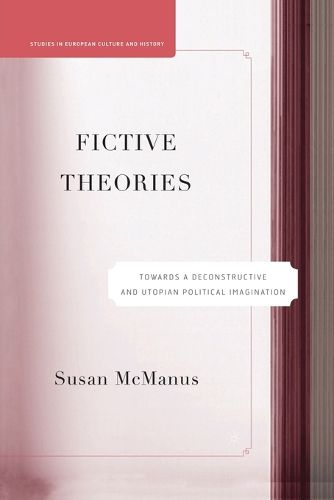Readings Newsletter
Become a Readings Member to make your shopping experience even easier.
Sign in or sign up for free!
You’re not far away from qualifying for FREE standard shipping within Australia
You’ve qualified for FREE standard shipping within Australia
The cart is loading…






This title is printed to order. This book may have been self-published. If so, we cannot guarantee the quality of the content. In the main most books will have gone through the editing process however some may not. We therefore suggest that you be aware of this before ordering this book. If in doubt check either the author or publisher’s details as we are unable to accept any returns unless they are faulty. Please contact us if you have any questions.
Fictive Theories is a significant and innovative intervention in key debates in political theory concerning the ways theory should be philosophically grounded, and the task that political theory should set itself. Susan McManus argues that political theory has been grounded in controlling fictions (from fictions of human nature, to morals laws) that function to close possibility. Starting by interrogating the often hidden work of fictions in political theories, she argues that all theorizing is a form of world-creating. Rather than hiding the fictions at work in political theory, McManus argues that theory should become self-consciously fictive, and that there are political and ethical advantages to so doing. She then develops a uniquely deconstructive and utopian understanding of the project of political theory grounded in the ‘fictive’: a creative and future-oriented imagination. Rather than seeking to provide blueprints of how a polity should be organized, fictive theories seek to fabricate futures through the anticipatory articulation of possibility. Drawing on a rich range of thinkers from the traditions of political theory (Hobbes, Rousseau, Kant), deconstructive theory (Roland Barthes, Jacques Derrida) and utopian studies (Ernst Bloch), this book will be of interest to researchers, teachers and students in the fields of political theory, utopian studies, literary theory and cultural studies.
$9.00 standard shipping within Australia
FREE standard shipping within Australia for orders over $100.00
Express & International shipping calculated at checkout
This title is printed to order. This book may have been self-published. If so, we cannot guarantee the quality of the content. In the main most books will have gone through the editing process however some may not. We therefore suggest that you be aware of this before ordering this book. If in doubt check either the author or publisher’s details as we are unable to accept any returns unless they are faulty. Please contact us if you have any questions.
Fictive Theories is a significant and innovative intervention in key debates in political theory concerning the ways theory should be philosophically grounded, and the task that political theory should set itself. Susan McManus argues that political theory has been grounded in controlling fictions (from fictions of human nature, to morals laws) that function to close possibility. Starting by interrogating the often hidden work of fictions in political theories, she argues that all theorizing is a form of world-creating. Rather than hiding the fictions at work in political theory, McManus argues that theory should become self-consciously fictive, and that there are political and ethical advantages to so doing. She then develops a uniquely deconstructive and utopian understanding of the project of political theory grounded in the ‘fictive’: a creative and future-oriented imagination. Rather than seeking to provide blueprints of how a polity should be organized, fictive theories seek to fabricate futures through the anticipatory articulation of possibility. Drawing on a rich range of thinkers from the traditions of political theory (Hobbes, Rousseau, Kant), deconstructive theory (Roland Barthes, Jacques Derrida) and utopian studies (Ernst Bloch), this book will be of interest to researchers, teachers and students in the fields of political theory, utopian studies, literary theory and cultural studies.